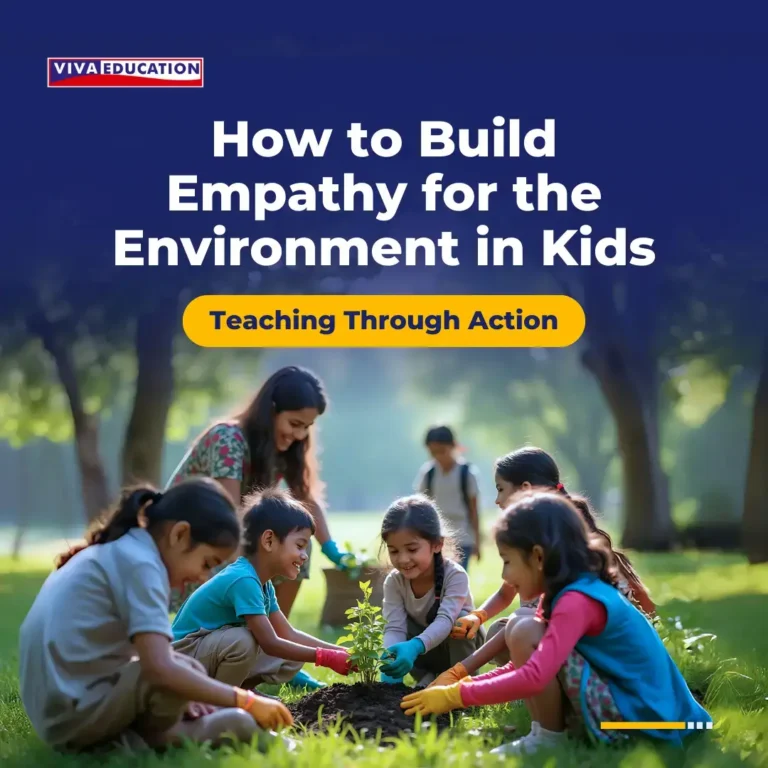50 Daily Positive Affirmations for Students to Boost Confidence, Focus & Well-Being
- Teachers
- May 30, 2025
- Viva Education

Every day is an emotional adventure for children. One moment, they’re glowing with pride over a gold star, and the next, they’re quietly upset because a friend didn’t sit with them at lunch. Growing up is full of new feelings, small wins, and harsh lessons, and through it all, the voice in a child’s head plays a decisive role. Sometimes it cheers them on. Other times, it holds them back.
That’s where positive affirmations can make a world of difference.
They act like a gentle pat on the back, short, powerful phrases that act like emotional armour. Backed by science, these statements help rewire the brain, boost self-esteem, and guide children toward a more positive mindset. Whether it’s “I am enough” or “I learn from my mistakes,” affirmations can make a real difference in how students see themselves and their world.
Starting from the 2025–26 academic year, all CBSE schools across India will incorporate daily positive affirmations into their morning assemblies. It’s a simple, yet meaningful step with a significant emotional impact, helping children start their day with focus and self-belief.
Not sure where to begin? We’ve got you covered from understanding how affirmations work to a curated list of 50 powerful affirmations for primary to senior students.
What Are Positive Affirmations?
Positive affirmations are short, powerful statements designed to encourage a positive mindset, boost self-confidence, and promote emotional well-being. They are typically written or spoken in the present tense, focusing on strengths, goals, or desired behaviours to reinforce self-belief and challenge negative thoughts. By repeating affirmations regularly, individuals can reframe their thinking, foster resilience, and align their actions with their values.
How Do Positive Affirmations Work?
When you repeat a positive affirmation like “I am capable of achieving my goals,” you’re sending a signal to your brain’s reticular activating system (RAS), a network that filters information and decides what to focus on. The RAS helps prioritise thoughts and emotions that align with your affirmations, making you more likely to notice opportunities, stay motivated, and act in ways that support your goals. For example, a student who affirms “I can solve problems with my mind and heart” might start noticing creative solutions during challenging school projects or conflicts with friends.
Over time, affirmations counteract negative self-talk, which often stems from the brain’s negativity bias, a survival mechanism that causes us to focus on threats or failures. By consciously repeating positive statements, you challenge those automatic negative thoughts (e.g., “I’m not good enough”) and replace them with constructive beliefs. This repetition strengthens neural connections, making positive thinking more automatic and habitual.
A Closer Look at the CBSE Guidelines
In its circular dated May 6, 2025, the CBSE emphasised the daily use of positive affirmations to nurture emotional strength, empathy, and self-worth in students. Schools have the flexibility to implement positive affirmations for students, but must ensure that they are meaningful and inclusive. Key highlights include:
- 1–2 affirmations daily during morning assemblies
- Age-appropriate and value-based content
- Active student participation, including creating or reciting affirmations
- Multilingual delivery in English, Hindi, or regional languages
- Display affirmations in classrooms and hallways
- Flexibility and innovation, allowing creative formats and regular feedback
This initiative aims to create uplifting, student-centred school environments.
50 Positive Affirmations for Morning School Assemblies
Primary Students
- I am a good friend who shares and cares.
- I can learn new things every day.
- My mistakes help me grow stronger.
- I am brave when I try something new.
- I listen to my teacher and friends.
- I am happy being me.
- I can ask for help when I need it.
- I use kind words with everyone.
- I am proud of my hard work.
- I can do big things one step at a time.
- I am safe to be myself.
- I enjoy learning and exploring.
- I am patient with myself and others.
- I can make good choices.
- I am loved and important.
- I try my best, and that’s enough.
- I have a big imagination that helps me create.
Middle School
- I am strong enough to face challenges.
- I choose to stay positive, even when it’s tough.
- I learn from my mistakes and keep going.
- I am in charge of my own effort.
- I can solve problems with my mind and heart.
- I respect myself and others.
- I am capable of doing hard things.
- I stay focused on what matters to me.
- I am growing into a better version of myself.
- I can handle change with courage.
- I choose to be kind, even when others aren’t.
- My ideas and voice are essential.
- I work hard to reach my goals.
- I can stay calm when I feel upset.
- I am unique, and that’s my strength.
- I listen to others and share my thoughts.
- I am building a bright future with my choices.
Senior Students
- I am confident in my ability to succeed.
- I face challenges with focus and determination.
- I am responsible for my own path.
- I learn from setbacks and grow stronger.
- I make choices that align with my values.
- I am capable of achieving my dreams.
- I manage stress with clarity and calm.
- I value my strengths and accept my flaws.
- I contribute positively to my community.
- I am prepared to take on new opportunities.
- I trust myself to make smart decisions.
- I respect others and earn respect in return.
- I am focused on creating a meaningful future.
- I handle pressure with grace and effort.
- I am worthy of my goals and ambitions.
- I embrace change as a chance to grow.”
Benefits of Positive Affirmations for Students
- Improves Mood:
Daily affirmations help students start the day with a positive outlook, reducing anxiety and boosting emotional well-being. - Builds Confidence:
Statements like “I can do this” strengthen self-belief and encourage students to face challenges without fear. - Enhances Focus:
Positive affirmations help improve concentration and reduce distractions, leading to better classroom engagement. - Boosts Self-Esteem:
Affirmations reinforce a strong self-image, helping students feel valued and capable just as they are. - Reduces Stress:
Calming affirmations lower anxiety and help students manage pressure, especially during exams or social situations. - Supports Health:
A positive mindset contributes to better sleep, energy, and overall health, reducing school absences. - Improves Relationships:
Affirming kindness and empathy promotes respectful behaviour, enhancing peer and teacher connections. - Increases Motivation:
Affirmations like “I’m working toward my goals” foster perseverance and a growth mindset.
Start the Day with Belief
A single sentence said with intention can shift a student’s mindset, brighten their mood, and change the way they face the world. With CBSE’s new initiative, schools are no longer just places of academic learning; they’re becoming nurturing spaces that empower every child from the inside out.
Whether you’re a teacher guiding young minds, a student looking for strength, or a parent cheering from the sidelines, remember: words matter. And when those words are filled with courage, kindness, and hope, they echo far beyond the morning assembly.
So tomorrow morning, when the bell rings and the school grounds fill with voices, let those voices carry something powerful: a belief in what’s possible.
Because when students start their day by saying “I believe in myself” they begin to live it.
Frequently Asked Questions:
1. What are positive affirmations, and why are they important in schools?
Positive affirmations are short, encouraging statements that help build self-confidence and promote a positive mindset. In schools, they support students’ emotional well-being, improve focus, and create a nurturing, optimistic environment.
2. Are schools required to use the exact affirmations provided by CBSE?
No. Schools are encouraged to adapt or create affirmations that best fit their students’ needs, while ensuring they reflect core values like empathy, courage, and self-worth.
3. Can affirmations be conducted in regional languages?
Yes! Affirmations can be delivered in English, Hindi, or any regional language to ensure all students understand and connect with the message.
4. How can schools ensure that affirmations are age-appropriate?
Schools should tailor affirmations to match students’ developmental stages and experiences, using simpler language and concepts for younger children and more complex ideas for older students.
5. How will the effectiveness of daily affirmations be evaluated?
Schools are encouraged to observe how daily positive affirmations impact students’ mood, behaviour, and engagement over time. Feedback from teachers, students, and parents can also help assess the program’s impact, along with regular reviews of its approach.
Share on:



